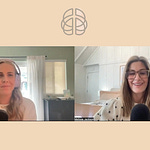Q: How do you feel about the language around neurodiversity? Differences versus disorders. Where do you stand?
This question was submitted for our Q+A series with Megan Barnett. We’re curious where you stand on it?
Here’s our take:
Megan Barnett: So I'm recording this seven week ADHD executive function parent course, and I just had to re-film the whole second chapter because I realized how important it is to articulate this.
When we look at ADHD, I feel, it's a neurodevelopmental, neurobiological difference. A lot of the literature, says that ADHD is a neurodevelopmental disorder.
I would argue, this is my opinion, that “disorder” is very important when you are presenting an argument that your child needs more support in school. Using that language qualifies you for services. Also taking the SAT, ACT, right? Or getting these different accommodations and support. In our world and modern society, the word disorder is gives us access to certain supports.
But, overall, I really like to use the word “difference” because it is a neurodevelopmental difference. It's a difference in how the prefrontal cortex is developing. It's a difference in how dopamine and neuroepinephrine is accessed in the brain.
Albert Einstein once said: "Everyone is a genius. But if you judge a fish by its ability to climb a tree, it will live its whole life believing that it is stupid."
It's very environmental based
If you put a group of children in a situation and said, okay, the task is to come up with the most novel idea of how to connect this tennis ball and and make it go down a chute and land over there- a child with ADHD would not be labeled as having a disorder. They would excel in that environment.
We're calling it a disorder based on the confines of society and how society is saying: you're disordered if you can't sit still, abide by the rules, not blurt out questions, can't attend for extended periods of time. But who's setting these rules exactly right?
Melissa: Yeah. I'm on the same page. It's the environment. Our society is established to accommodate and privilege neurotypical brain wiring. A certain way of operating and being has been established as the “right” “good” way to be.
But when we really pull it back from an evolutionary perspective:
the neurotypicals were the farmers
and the neurodivergents were the hunters.
The neurodivergents served a purpose. Being on the go and being able to react quickly to stimuli and all of that was genetically a predisposition because we needed that type of wiring.
It's just now the environments that we find ourselves in, we don't value that type of wiring. However, later in life we do. That's the irony in it.
These are the people who are our innovators, our creatives, our entrepreneurs who have these big social justice causes that are making impact in the world.
But our school systems are designed for the farmers. For the neurotypicals who can sit and wait patiently for their crops to grow and not get up and chase, whatever.
And so I just think it's really interesting when we truly step back and look at the environment as creating these boxes of people that are disordered or not disordered, you know?
However, to your point, we are in a system right now where the environments are ultimately created for a neurotypical. And so to balance this out, we require this label to qualify for the services that people need to make the environment equitable.
Megan Barnett: 100%. We can even pull out the phrase neurotypical and just say it's created for a specific neurotype, right? What even is typical?
The other thing that's been brought up to me, because some of my clients are in high school, some of them are college students and some are adults.
One of my college students said: “It's dangerous though to say ADHD is a superpower because that is kind of discrediting the tremendous struggles that can occur with ADHD.”
So that's again where the disorder component comes in because it can create really intense challenges throughout the day.
So it's a dance with what language we're using.
It's important for the family member who says ADHD is just a badly behaved child.
Then I use the word disorder and I'm like look at these brain scans. Look how different it is, Neurobiologically.
But “difference” really, encapsulates what's really going on.
Melissa: I agree. As someone who is neurodivergent, I know you are too, that just lands better in my body.
Like if someone says you have a learning disorder, I'm like, no, I don't. It's not me. That's never landed with me as truth. I learned differently, but I know my gifts. I know my strengths. I'm good at things. And I also know my challenges.
And I also recognize that as humans, we all have strengths, we all have weaknesses- it's just the environments we've created have honored a certain profile of strength.
That make those challenges of ADHD feel so dysregulating and a “disorder” or deficit because we don't have the freedom to operate in the way that's actually aligned for us because we're supposed to fit in this other box.
So I guess for me, differences definitely lands as more true, however I understand the limitations of the society we're in now and the need for the language we have now for access to certain support.


















Share this post